Exploring the poignant history of Ghana’s past through walking tours in Cape Coast and Elmina is a profound and immersive experience. Visitors uncover the legacy of the transatlantic slave trade at UNESCO-recognized sites like the 15th-century Elmina Slave Castle, gaining insights from knowledgeable guides. Beyond the somber moments, these tours also showcase the resilience and cultural heritage of the Ghanaian people, inviting guests to savor local cuisine and bask in the stunning coastal scenery. For those seeking a deeper understanding of this complex chapter and its lasting impact, these walking tours offer a thought-provoking journey that lingers long after the final steps.
Key Points
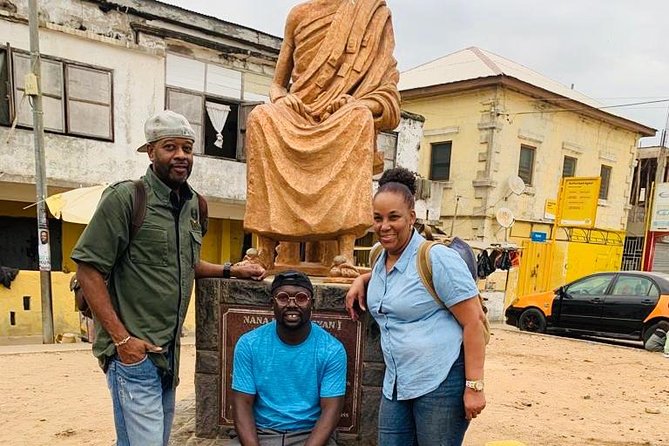
- Immersive walking tours exploring the historical significance of the transatlantic slave trade in Elmina and Cape Coast, Ghana.
- Visits to the 15th-century Elmina Castle, a UNESCO World Heritage site, and the Dutch Cemetery in Cape Coast.
- Personalized insights from knowledgeable guides, enhancing understanding of Ghanaian resilience and cultural traditions.
- Inclusion of local cuisine and scenic views, creating a well-rounded educational and cultural experience.
- Flexible booking options, with free cancellation up to 24 hours in advance, suitable for most participants.
Tour Overview
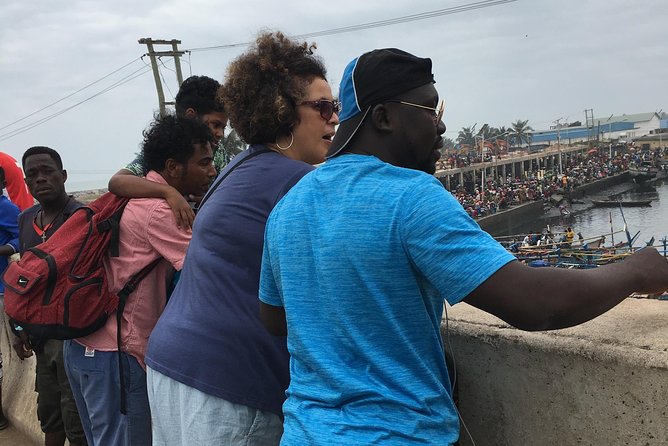
The walking tour offers an immersive exploration of the historic towns of Elmina and Cape Coast in Ghana.
Led by a private guide, travelers will learn about the region’s pivotal role in the transatlantic slave trade. They’ll visit the oldest building in sub-Saharan Africa, dating back to 1484 when the Portuguese constructed it.
The tour also includes stops at a Dutch cemetery, colonial houses, and a lunch with stunning views of a lagoon and castle.
Throughout the experience, the guide provides personalized insights, fostering a deeper understanding of this poignant chapter in history and the resilience of the Ghanaian people.
If you're enjoying exploring Accra on foot, you'll love these other walking tours we recommend
Inclusions and Pricing
This tour includes several amenities to enhance the experience. Lunch, bottled water, and snacks are all provided.
Gratuities are also included in the tour price, which starts from $92.31 per person. Travelers can take advantage of the free cancellation policy up to 24 hours before the tour begins, and a convenient reserve now, pay later option is available.
The tour caters to most participants, though it isn’t wheelchair accessible. The inclusions and pricing make this an accessible and well-rounded experience for exploring the historical sites of Cape Coast and Elmina.
Meeting and Pickup Details
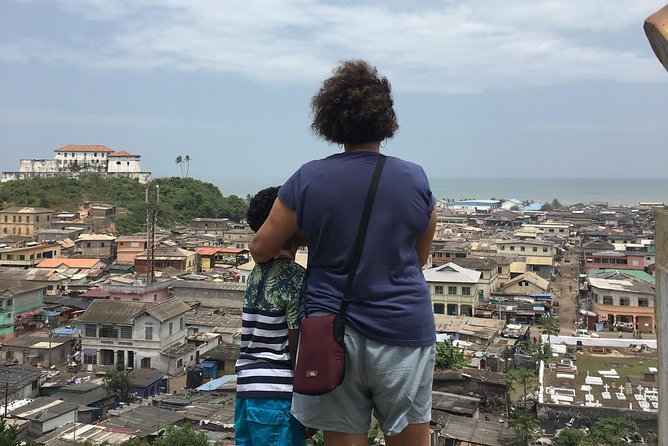
The tour starts in Cape Coast or Elmina, though pickup can be arranged from other locations, including Accra, for an additional driver and fuel cost.
The start time is 8:00 am. The tour isn’t wheelchair accessible, but service animals are allowed, and it’s situated near public transportation.
Infants must sit on laps, but most travelers can participate. While the tour isn’t suitable for those in wheelchairs, it caters to a wide range of visitors, offering flexibility in pickup locations and accommodating families with young children.
Reviews and Feedback
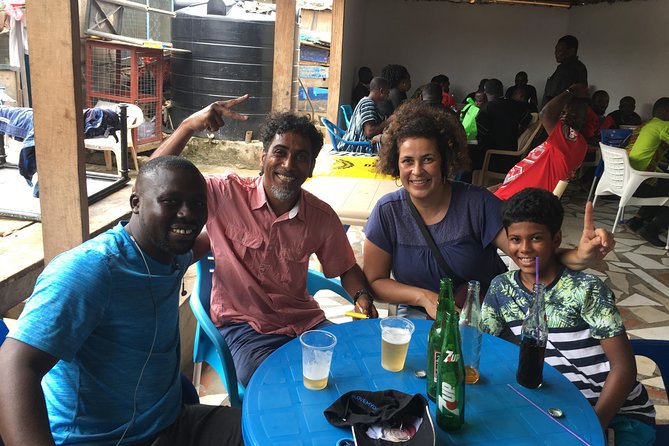
How do the reviews and feedback describe the walking tour in Cape Coast and Elmina?
The experience earns an impressive 5.0-star average rating across 8 reviews. Guests consistently praise the tour as "eye-opening" and "profound," highlighting the guide Nana’s exceptional knowledge and sensitivity in discussing the harrowing history of the transatlantic slave trade.
The small group size is noted to enhance the intimacy and personalization of the experience. Reviewers emphasize the educational value, with the tour effectively addressing the impacts of slavery while also celebrating the resilience and cultural traditions of the Ghanaian people.
Educational Experience
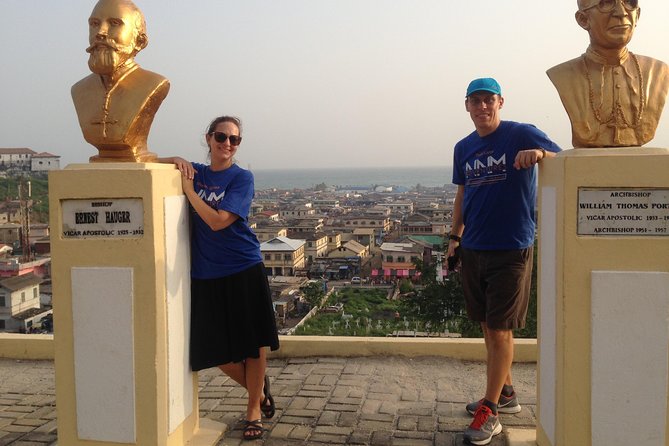
The walking tour offers an educational experience that addresses the harrowing era of the transatlantic slave trade and its profound impact on Ghanaian history.
Visitors learn about the resilience and cultural traditions of the Ghanaian people, as the tour emphasizes their resilience in the face of such adversity.
The stark contrast between the white castle walls and the vibrant colors of the fishing boats serves as a poignant reminder of the complex history.
Encouraging questions fosters respectful discussions about the past and the ongoing process of healing, providing a thought-provoking and impactful learning experience for all who participate.
- Know Ghana in 4 Hrs – Accra City Tour
- The Homecoming Experience To Cape-coast And Elmina.
- Escape Accra City to Aburi Gardens and Tetteh Quarshie Cocoa Farms
- Experience Boti Waterfalls, Aburi Botanical Gardens & Tetteh Quarshie Cocoa Farm
- Ghana City 2-day Tour
- The Ancestral Naming Ceremony and Home Coming Experience
Exploring Elmina Slave Castle
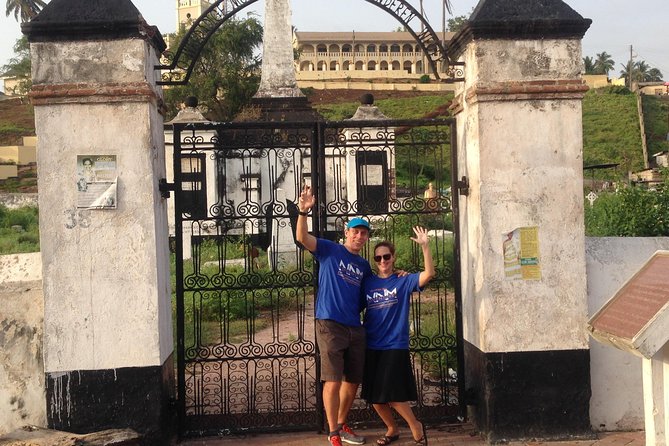
Elmina Slave Castle stands as a poignant reminder of Ghana’s harrowing past. Visitors can explore this 15th-century fortress, the oldest European building in sub-Saharan Africa. The castle’s stark white walls belie its dark history as a hub of the transatlantic slave trade. Guided tours offer a profound look into this chapter, with opportunities to learn about the resilience and cultural traditions of the Ghanaian people.
| Feature | Description |
|---|---|
| Construction | Built by the Portuguese in 1484 |
| Purpose | Held and processed slaves before transatlantic transport |
| Significance | Largest slave-trading site in West Africa |
| Current Status | Designated a UNESCO World Heritage Site |
| Visitor Experience | Walking tours with knowledgeable guides |
Discovering Dutch Cemetery
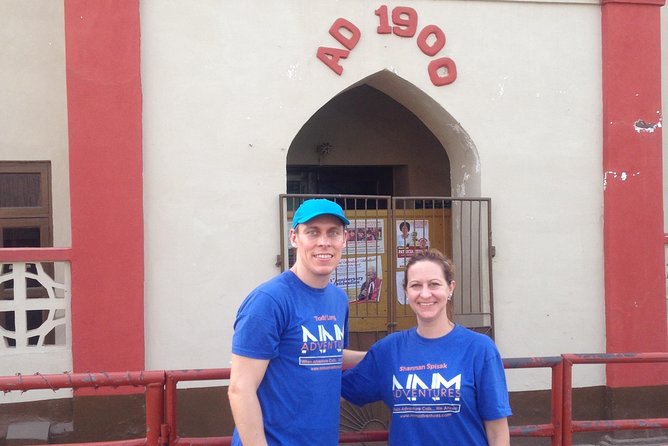
Nestled within the historic town of Cape Coast lies the Dutch Cemetery, a poignant testament to the colonial era.
This tranquil resting place is adorned with weathered gravestones, each inscribed with the names and epitaphs of the Dutch settlers who once called this region home.
As visitors stroll among the rows of monuments, they’re struck by the stark contrast between the somber atmosphere and the vibrant colors of the surrounding landscape.
The cemetery offers a sobering glimpse into the region’s past, reminding all who enter of the profound impact of the colonial experience on the people of Ghana.
It’s a powerful stop on the walking tour, inviting reflection and understanding.
Savoring Lunch With Views
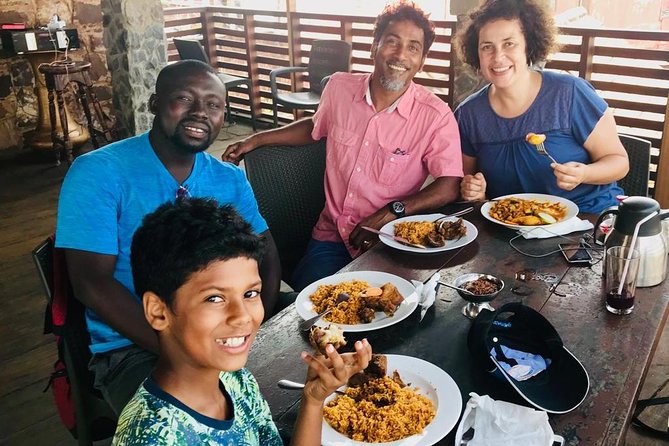
Following a morning of exploring the historic sites, the walking tour participants are then treated to a delightful lunch with breathtaking views.
They gather at a local restaurant overlooking the stunning lagoon and the iconic Elmina Castle. The setting provides a serene contrast to the sobering history learned earlier.
As they savor the fresh local cuisine, they can’t help but admire the colorful fishing boats and the vibrant Ghanaian culture surrounding them.
This lunch break allows them to reflect on the morning’s experiences and recharge before continuing their journey of discovery.
The combination of nourishing food and picturesque vistas creates an unforgettable moment during the walking tour.
Frequently Asked Questions
Is the Tour Appropriate for Children?
The tour may not be suitable for young children as it delves into the harrowing history of the transatlantic slave trade. It’s best for older kids and teens with a strong interest in learning about this difficult chapter of history.
Can We Take Photos Inside the Castle?
Visitors are generally allowed to take photos inside the Elmina Slave Castle, though some areas may have restrictions. It’s best to check with the tour guide or staff beforehand to ensure compliance with any rules or guidelines.
What Languages Does the Guide Speak?
The tour guide for this experience speaks both English and the local Ghanaian language, allowing them to provide a comprehensive and insightful exploration of the Elmina Slave Castle’s history for visitors from various backgrounds.
Are There Any Health/Medical Concerns to Be Aware Of?
The tour is generally accessible, but there are a few health considerations. While not wheelchair-friendly, travelers with limited mobility can participate. Infants must be held, and visitors should be mindful of the outdoor walking in Ghana’s climate.
How Strenuous Is the Walking Involved in the Tour?
The walking involved in the tour is moderate, with some inclines and uneven terrain. Participants should have a reasonable level of mobility and fitness to fully enjoy the experience. Breaks are provided, and the guide adjusts the pace to accommodate the group’s needs.
Recap
Walking tours in Cape Coast and Elmina offer an immersive and educational experience that allows visitors to explore Ghana’s poignant history, particularly the transatlantic slave trade. Participants engage with knowledgeable guides, visit significant sites like the Elmina Slave Castle, and savor local cuisine, all while reflecting on the profound impact of this historical legacy amidst stunning coastal scenery. These tours provide a meaningful opportunity to gain insights into the resilience and cultural heritage of the Ghanaian people.
More Tours in Accra
More Tour Reviews in Accra
- Private Day Trip Exploring Authentic Ghanian Slave Trade History
- Aburi Gardens and Tetteh Quarshie Farms
- A Taste of West Africa – Ghana Togo & Benin
- Ghana Eastern Explorer – Boti Falls, Aburi Gardens & Tetther Quarshie Cocoa Farm
- Cape Coast Castle, Assin Manso Slave River and Door of No Return
- Cape Coast Castle and Kakum National Park 2-Day Private Tour
Not for you? Here's more things to do in Accra we have recnetly reviewed
- 3 Best Guided Tours In Accra
- 4 Best Shopping Tours In Accra
- 2 Best 2 Day Tours In Accra
- Elmina Slave Dungeon & Kakum Rainforest Day Trip
- Elmina & Cape Coast Castles Day Trip From Accra
- Boti Falls & Aburi Botanical Gardens Experience
- Introducing Ghana, 6 Days
- Cape Coast /Elmina Castles and the Door Of No Return
- Accra City Tour
- Half-Day Private African Drumming Lessons With Pick up
- Discover Ghana – Wli Waterfalls, Mountain Afadjato, Monkey Sanctuary & Akosombo.
- A 9 Days Experience Of The Motherland
